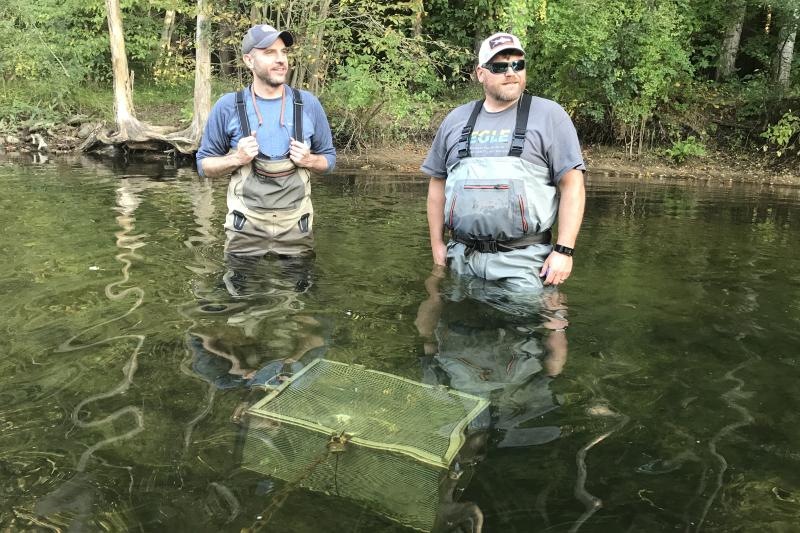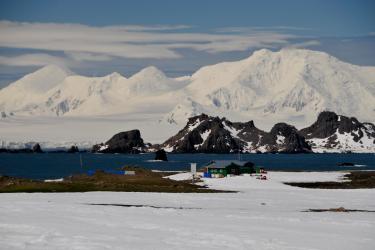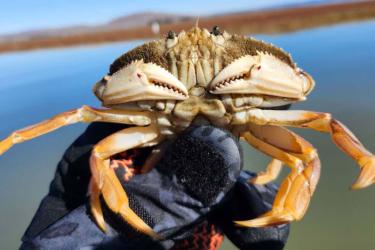After being inspired about seafood sustainability as a high-end restaurant chef, Air Force veteran, Barney Boyer, pivoted to get an education in biology. He went further in a fisheries-focused Veteran Conservation Corps internship through a partnership between NOAA Fisheries and the Washington Department of Veterans Affairs. Later, he earned a graduate degree in aquatic sciences. Now he’s continuing his career working to ensure Great Lakes fisheries have clean water to thrive with our partners at the Michigan Department of Environment, Great Lakes, and Energy.
How did he get to his current job working with communities restoring waters impaired by—and protecting waters threatened by—pollution? Along with hard work, according to Barney, a lot of it hinged on the NOAA internship. He was the first intern in the newly developed partnership which provided him broad science and research-focused skills supporting our habitat and fish restoration work.
As a veteran intern at the Northwest Fisheries Science Center’s Mukilteo Research Station, Barney worked on a variety of projects all having a positive impact on restoration. He gained experience both in the field collecting data and monitoring projects, and in the office developing scientific research papers. He applied statistical analysis and learned different programming languages to support analyses.
“It was wonderful to wake up in the morning and know I was going to be outside, on a boat and in the water. I enjoyed the great conversations I had with the fisheries biologists, and more importantly, learning about the fish communities we were monitoring, and how we are helping to restore their habitats."
One example of that research is analyzing how fish in the Elwha River Estuary are reacting after a massive dam removal. The removal released 100 years of accumulated sediment into the Salish Sea. He also helped monitor restoration of the Snohomish River and Estuary after parts of it were reconnected back to their historic tidal flows. That work included tracking how young salmon use the habitat, and analyzing data on invasive species that feed on those young salmon. This research focused on understanding their behaviors, populations, and other characteristics to help inform actions to help native fish.
That research improved Barney’s writing skills, and he enhanced his presentation and communications skills by taking his research to poster sessions. He also interviewed local stakeholders, municipalities, and university researchers supporting restoration in the area to hone those interpersonal skills. All of these experiences helped round out Barney’s skillsets, preparing him for a future career. He was able to apply for, interview with, and get accepted under an assistantship to a graduate program focused on aquatic sciences at Grand Valley State University in Michigan.
After graduation, Barney landed his current job working with Michigan communities to reduce pollution in rivers, lakes, and streams. His work builds on the foundation gained from his service in the Air Force, and experience as a NOAA veteran intern in Washington. Combined with his education, success and a bright future are sure to lie ahead.
His advice to future interns in the program:
“Pick the brains of all the people around you to help fill in the areas that the field and research work might not fulfill. Put in the work and take full advantage of this opportunity and you’ll be successful.”
NOAA appreciates the dedication of our armed service members to their mission. We’re proud to provide Barney and other veterans with meaningful experiences in the natural resources field after their military duties are complete.
Currently our veteran conservation corps programs are in Washington, California and Oregon, with other states onboarding programs in the future. While each state’s focus is slightly different, they’re all based on common goals:
- Supporting veterans’ natural resource career paths
- Providing meaningful comprehensive experiences
- Helping improve the science and resource management job pipeline with strong and diverse talent
This partnership is supported by funding from the Washington State Department of Veterans Affairs, and NOAA’s Office of Habitat Conservation, and West Coast Regional Office.




